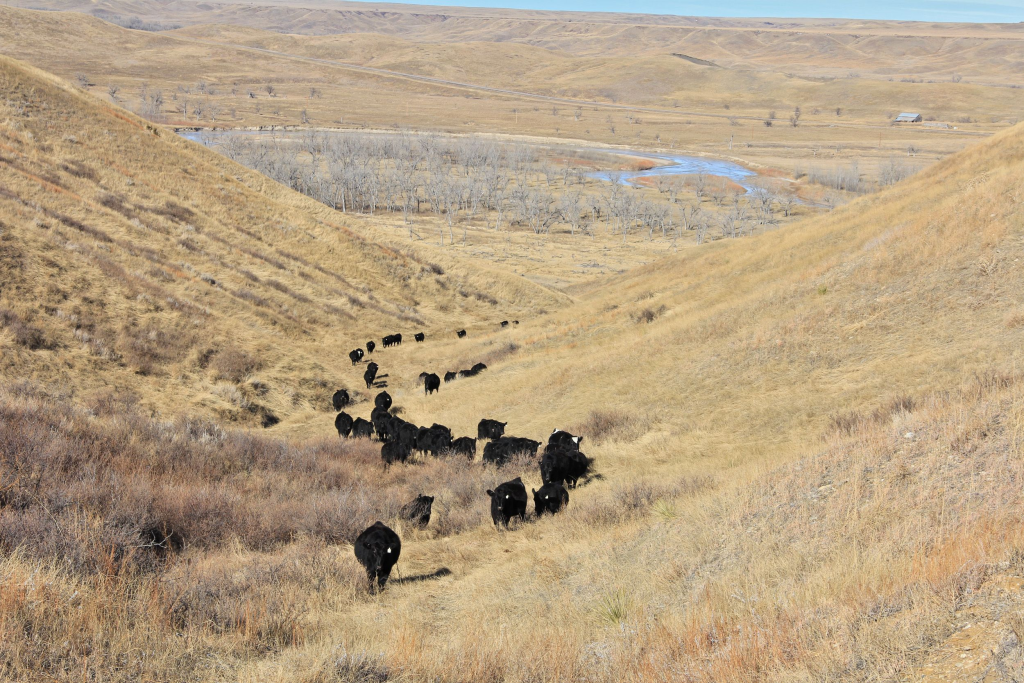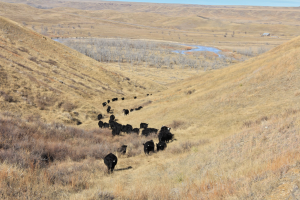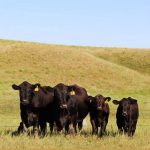Hurry up and wait: Maudes’ land dispute still not settled

Maude-RFP-072825
Charles and Heather Maude no longer face the threat of a prison sentence but three months after the announcement in Washington, D.C., they continue to wait for a solution to a problem they didn’t know existed.
The Maudes, a young ranching couple from western South Dakota, were charged with a felony in May of 2024, the indictment saying they “did steal, purloin and convert to their own use” federal property — 25 acres of grazing land and 25 acres of cultivated land. This, after a U.S. Forest Service investigator alerted them that the fence dividing their private land and U.S. Forest Service Buffalo Gap National Grasslands land that they rent may not be in the right location. The agent met with the Maudes twice to discuss boundary lines and possible solutions, led a survey team (the results of which are not known), and delivered them a grand jury felony indictment, all within the span of three months.
CHARGES DISMISSED
In April 2025, Secretary of the U.S. Department of Agriculture Brooke Rollins invited them to a press conference to announce the dismissal of the felony charges. The couple rushed to reserve plane tickets and hotel rooms in the nation’s capital, thrilled with the news that the felony charges had been dropped.
“We are both fifth generation farmers and ranchers. Our families have a combined 250 years in production agriculture. We paused briefly in that pursuit in our grandfathers’ generation. Both of my grandfathers fought in World War II. Charles’ great grandfather is a four-star war mom. Her four sons fought in WW II and all four sons came home. Since then we have pursued our primary passion, which is production agriculture. When this hit, it hit in the heart and soul of our place. The Maude family came to this area in 1907 and purchased adjoining land in 1910 and have managed it without incident and with great care since then,” said Heather in the press conference.
“May God bless you and God bless America and God bless American agriculture. Thank you,” concluded Heather’s speech that day.
Heather soon made a sobering statement on social media: The issue was not “fixed,” she said. While very thankful for the dismissal of the charges, the couple was now back to where they had been in May of 2024: hoping to resolve the USFS’s concerns so that they could return to life as they knew it — making hay, weaning calves, feeding hay, selling calves, calving cows and repeat. The cycle of ranch life. Now, in late July, the couple remains no closer to a resolution on their case than they did that day.
In early spring of 2024, Maudes planted hay barley in the field where the boundary dispute occurred. Following the May 6, 2024, survey, Maudes ceased all activity on the field, both the private acres and the acres in question. They hayed the portion of the hay barley crop on their side of the survey line in the summer of 2024, and have not replanted any part of the field since. As the summer days tick by, their opportunity to plant and harvest on their own land that adjoins U.S. Forest Service Buffalo Gap National Grasslands land is slipping away.
The Maudes’ USFS BGNG grazing permit remains in good standing, with no record of complaint. A member of the Maude family has farmed the land in question on and off since the early 1900s and the fence along the property has been in place since at least the 1950s.
After the Maudes’ case was dismissed and their gag order removed, they responded to media questions and have accepted invitations to speak to several industry organizations.
MAUDE SUPPORTERS
R-CALF USA Property Rights Committee Chairman Shad Sullivan said the Maude case needs to be resolved immediately. He said the U.S. federal government should be aware of the Maudes’ expenses such as time, fuel for travel, emotional distress, inability to conduct normal ranching activities, etc. “I don’t know what the reimbursement should look like but at the end of the day, it’s someone’s job to rectify this wrong,” he said. “The Maudes didn’t ask for this. The government came to them and said ‘this is an issue that needs to be resolved.’ All the Maudes want to do is return to normal life, which is raising cattle, hogs and crops and working together as a family. Their operation has been severely handicapped, and continues to be,” he said. It is the responsibility of the government to take accountability and rectify the situation as soon as possible, he said.
Sullivan said he was pleased to see the Maudes case dropped, but he is troubled by the fact that they are not back to ranching as normal. Their inability to grow feed on the river bottom could destroy their operation long term, he said.
South Dakota Stockgrowers Association Federal Lands Committee Chair J.T. Rickenbach agrees. In fact his organization would like to see a full investigation done in order to determine whether agents mistreated the Maudes and others, and in what ways. Their policy asks the government to: “Federally prosecute and re-organize USFS based on findings” of the investigation.
The organization’s members approved policy that calls on the USFS to work more closely with allotment owners and to consider allotment owners “experts” regarding their allotments and for the USFS to treat them as such. Communication and negotiation should be as local as possible, they say.
Maude neighbor and fellow rancher Scott Edoff has worked for months to educate and inform elected officials and the media about the Maude situation. He agrees that the USFS should conduct a “deep dive” to research their employees’ actions.
Edoff suggests that USDA Secretary Rollins send a personal representative to the Maude ranch to meet with them and help them resolve the issue quickly. He agrees with the stockgrowers that the agency needs to be looked at “from the bottom up.”
He points out a fellow rancher in his community whose allotment water line is broken. “The ranger won’t let them fix it,” Edoff said.
Edoff said employees need to be held accountable for their actions. “The problem isn’t the law, it’s the implementation of the law, or lack thereof,” he said.
“Someone in USDA needs to get input from ranchers and find out what is really wrong and take that information back to Rollins and see if we can figure out why a lot of these USFS employees aren’t doing their jobs.”








